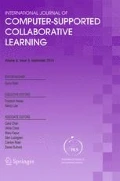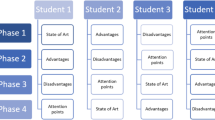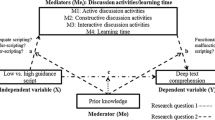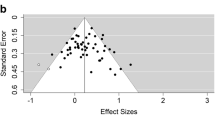Abstract
Some recent proposals on CSCL scripts have suggested that one key factor for their effectiveness is the ability of the teacher to adapt the scripts to the students and to the specific teaching and learning situations. In this context, this paper presents a multiple-case study dealing with the relationship between the assistance given by the teacher during the collaborative process and the forms of collaborative work developed by groups of university students in two natural settings, in which two different types of macro-script are used. Specifically, the study sets itself three objectives: (1) to identify patterns of teacher assistance to the collaborative work developed by the groups; (2) to identify the forms of collaborative work developed by the groups; and (3) to explore the relationships between the patterns of teacher assistance, the forms of collaborative work and the level of performance achieved by the groups. The results show two different patterns of teacher assistance in the two settings. These patterns differ on four dimensions: the aspect of the task on which the teacher was offering assistance, the moment in which the assistance was offered, the recipient of the assistance, and whether the assistance offered by the teacher was spontaneous or requested by the students. These patterns are related with the forms of collaborative work developed by the groups (how the group is organized and how the written work is produced) within the structural framework imposed, in each setting, by the macro-script.

Similar content being viewed by others
Notes
A didactic sequence (DS) is defined as a process that includes all the typical components of a teaching and learning process -goals, content, teaching/learning activities and assessment activities- in which it is possible to identify a beginning, a development and an end.
References
Anderson, T., Rourke, L., Garrison, D. R., & Archer, W. (2001). Assessing teaching presence in a computer conference context. Journal of Asynchronous Learning Networks, 5(2), 1–17.
Arvaja, M., Rasku-Puttonen, H., Häkkinen, P., & Eteläpelto, A. (2003). Constructing knowledge through a role-play in a web-based learning environment. Journal of Educational Computing Research, 28(4), 319–341.
Barnes, D. (1976). From communication to curriculum. Harmondsworth: Penguin.
Bereiter, C. (1994). Implications of postmodernism for science, or, science as progressive discourse. Educational Psychologist, 29(1), 3–12.
Berge, Z. L. (1995). Facilitating computer conferencing: Recommendations from the field. Educational Technology, 35(1), 22–30.
Blaye, A., & Light, P. (1990). Computer-based learning: The social dimensions. In H. C. Foot, M. J. Morgan, & R. H. Shute (Eds.), Children helping children (pp. 135–150). Chichester: Wiley.
Coll, C., Mauri, T., & Onrubia, J. (2008a). Análisis de los usos reales de las TIC en contextos educativos formales: una aproximación sociocultural. Revista Electrónica de Investigación Educativa, 10(1). <http://redie.uabc.mx/vol10no1/contenido-coll2.html> Retrieved 08.08.08.
Coll, C., Onrubia, J., & Mauri, T. (2008). Ayudar a aprender en contextos educativos: El ejercicio de la influencia educativa y el análisis de la enseñanza. Revista de Educación, 346, 33–70.
Colomina, R., Onrubia, J., & Rochera, M. J. (2001). Interactividad, mecanismos de influencia educativa y construcción del conocimiento en el aula. In C. Coll, J. Palacios, & A. Marchesi (Eds.), Desarrollo psicológico y educación. Vol. II. Psicología de la educación escolar (pp. 437–458). Madrid: Alianza.
De Laat, M., Lally, V., Lipponen, L., & Simons, R. J. (2007). Online teaching in networked learning communities: A multi-method approach to studying the role of the teacher. Instructional Science, 35, 257–286.
De Wever, B., Van Keer, H., Schellens, T., & Valcke, M. (2007). Applying multilevel modelling on content analysis data: Methodological issues in the study of the impact of role assignment in asynchronous discussion groups. Learning and Instruction, 17, 436–447.
De Wever, B., Van Keer, H., Schellens, T., & Valcke, M. (2009). Structuring asynchronous discussion groups: The impact of role assignment and self-assessment on students’ levels of knowledge construction through social negotiation. Journal of Computer Assisted Learning, 25(2), 177–188.
Dillenbourg, P. (2002). Over-scripting CSCL: The risks of blending collaborative learning with instructional design. In P. A. Kirschner (Ed.), Three worlds of CSCL. Can we support CSCL (pp. 61–91). Heerlen: Open Universiteit Nederland.
Dillenbourg, P., & Fischer, F. (2007). Basics of computer-supported collaborative learning. Zeitschrift für Berufs- und Wirtschaftspädagogik, 21, 111–130.
Dillenbourg, P., & Hong, F. (2008). The mechanics of CSCL macro scripts. International Journal of Computer-Supported Collaborative Learning, 3(1), 5–23.
Dillenbourg, P., & Jermann, P. (2006). Designing integrative scripts. In F. Fischer, H. Mandl, J. Haake, & I. Kollar (Eds.), Scripting computer-supported collaborative learning: Cognitive, computational and educational perspectives (pp. 275–301). New York: Springer Verlag.
Dillenbourg, P., & Tchounikine, P. (2007). Flexibility in macro-scripts for computer-supported collaborative learning. Journal of Computer Assisted Learning, 23, 1–13.
Dillenbourg, P., Järvelä, S., & Fisher, F. (2009). The evolution of research on computer-supported collaborative learning: from design to orchestration. In N. Balacheff, S. Ludvigsen, T. de Jong, A. Lazonder, & S. Barnes (Eds.), Technology enhanced learning: Principles and products (pp. 3–19). Netherlands: Springer.
Engel, A., & Onrubia, J. (2008). Scripting computer-supported collaboration by university students. Interactive Educational Multimedia, 16, 33–53.
Engel, A., & Onrubia, J. (2010). Patrones de organización grupal y fases de construcción del conocimiento en entornos virtuales de aprendizaje colaborativo. Infancia y Aprendizaje, 33(4), 515–528.
Erkens, G., Jaspers, J., Prangsma, M., & Kanselaar, G. (2005). Coordination processes in computer supported collaborative writing. Computers in Human Behavior, 21(3), 463–486.
Fischer, F. & Dillenbourg, P. (2006). Challenges of orchestrating computer-supported collaborative learning. Paper presented at the 87th. Annual Meeting of the American Educational Research Association (AERA), San Francisco, USA.
Fischer, F., Mandl, H., Kollar, I., & Haake, J. (Eds.). (2007). Scripting computer-supported collaborative learning. Cognitive, computational and educational perspectives. New York: Springer Verlag.
Forman, E., & Cazden, C. (1985). Perspectivas vigotskianas en la educación: El valor cognitivo de la interacción entre iguales. Infancia y Aprendizaje, 27–28, 139–157.
Garrison, D. R., Anderson, T., & Archer, W. (2001). Critical thinking, cognitive presence, and computer conferencing in distance education. American Journal of Distance Education, 15(1).
Gunawardena, L., Lowe, C., & Anderson, T. (1997). Interaction analysis of a global on-line debate and the development of a constructivist interaction analysis model forcomputer conferencing. Journal of Educational Computing Research, 17(4), 395–429.
Hämäläinen, R., & Häkkinen, P. (2010). Teachers’ instructional planning for computer-supported collaborative learning: Macro-scripts as a pedagogical method to facilitate collaborative learning. Teaching and Teacher Education, 26(4), 871–877.
Järvelä, S., & Häkkinen, P. (2002). Web-based cases in teaching and learning: The quality of discussion and a stage of perspective taking in asynchronous communication. Interactive Learning Environments, 10(1), 1–22.
Kirschner, P. A., Sweller, J., & Clark, R. E. (2006). Why minimal guidance during instruction does not work: An analysis of the failure of constructivist, discovery, problem-based, experiential, and inquiry-based teaching. Educational Psychologist, 41(2), 75–86.
Kirschner, P. A., Beers, P. J., Boshuizen, H. P. A., & Gijselaers, W. H. (2008). Coercing shared knowledge in collaborative learning environments. Computers in Human Behavior, 24, 403–420.
Kobbe, L., Weinberger, A., Dillenbourg, P., Harrer, A., Hämäläinen, R., & Häkkinen, P. (2007). Specifying computer-supported collaboration scripts. International Journal of Computer-Supported Collaborative Learning, 2(2/3), 211–224.
Lipponen, L. (2002). Exploring foundations for computer-supported collaborative Learning. In G. Stahl (Ed.), Computer support for collaborative learning: Foundations for a CSCL community (pp. 72–81). Hillsdale: Lawrence Erlbaum.
Lockhorst, D. (2004). Design principles for a CSCL environment in teacher training. Unpublished doctoral dissertation. Universiteit Utrecht, The Netherlands. <http://www.uu.nl/uupublish/content/proefschriftLockhorst.pdf> Retrieved 05.05.06.
Manlove, S., Lazonder, A. W., & De Jong, T. (2009). Trends and issues of regulative support use during inquiry learning: Patterns from three studies. Computers in Human Behavior, 25(4), 795–803.
Mason, R. (1991). Moderating educational computer conference. DEOSNEWS, 1(19). <http://www.emoderators.com/papers/mason.html> Retrieved 05.05.06.
Meier, A., Spada, H., & Rummel, N. (2007). A rating scheme for assessing the quality of computer-supported collaboration processes. International Journal of Computer-Supported Collaborative Learning, 2(1), 63–86.
Mercer, N. (1995). The guided construction of knowledge: Talk amongst teachers and learners. Clevedon: Multilingual Matters.
Mercer, N. (2000). Words and minds. London: Routledge.
Onrubia, J., & Engel, A. (2009). Strategies for collaborative writing and phases of knowledge construction in CSCL environments. Computers & Education, 53(4), 1256–1265.
Paulsen, M. F. (1995). Moderating educational computer conferences. In Z. L. Berge & M. P. Collins (Eds.), Computer-mediated communication and the online classroom. Cresskill: Hampton Press.
Rourke, L., & Kanuka, H. (2007). Barriers to online critical discourse. International Journal of Computer-Supported Collaborative Learning, 2, 105–126.
Rummel, N., & Spada, H. (2005). Learning to collaborate: An instructional approach to promoting collaborative problem-solving in computer-mediated settings. Journal of the Learning Sciences, 14, 201–241.
Scardamalia, M., & Bereiter, C. (1994). Computer support for knowledge-building communities. The Journal of the Learning Sciences, 3(3), 265–283.
Scardamalia, M., & Bereiter, C. (2003). Knowledge building. In J. W. Guthrie (Ed.), Encyclopedia of education (2nd ed., pp. 1370–1373). New York: Macmillan Reference.
Schellens, T., Van Keer, H., & Valcke, M. (2005). The impact of role assignment on knowledge construction in asynchronous discussion groups: A multilevel analysis. Small Group Research, 36, 704–745.
Schellens, T., Van Keer, H., De Wever, B., & Valcke, M. (2007). Scripting by assigning roles: Does it improve knowledge construction in asynchronous discussion groups? International Journal of Computer-Supported Collaborative Learning, 2(2–3), 225–246.
Schrire, S. (2006). Knowledge building in asynchronous discussion groups: Going beyond quantitative analysis. Computers & Education, 46, 49–70.
Slof, B., Erkens, G., Kirschner, P. A., Jaspers, J. G. M., & Janssen, J. (2010). Guiding students’ online complex learning-task behavior through representational scripting. Computers in Human Behavior, 26(5), 927–939.
Stahl, G. (2005). Group cognition in computer-assisted collaborative learning. Journal of Computer Assisted Learning, 21(2), 79–90.
Stahl, G., Koschmann, T., & Suthers, D. (2006). Computer-supported collaborative learning: An historical perspective. In R. K. Sawyer (Ed.), Cambridge handbook of the learning sciences. Cambridge: Cambridge University Press.
Stegmann, K., Weinberger, A., & Fischer, F. (2007). Facilitating argumentative knowledge construction with computer-supported collaboration scripts. International Journal of Computer-Supported Collaborative Learning, 2(4), 421–447.
Strijbos, J. W., Martens, R. L., Jochems, W. M. G., & Broers, N. J. (2004). The effect of functional roles on group efficiency: Using multilevel modeling and content analysis to investigate computer-supported collaboration in small groups. Small Group Research, 35, 195–229.
Strijbos, J. W., de Laat, M., Martens, R. L., & Jochems, W. M. G. (2005). Functional versus spontaneous roles during CSCL. In T. Koschmann, D. Suthers, & T. W. Cahn (Eds.), Computer supported collaborative learning 2005: The next ten years! (pp. 567–576). Mahwah: LawrenceErlbaum Associates.
Strijbos, J. W., Martens, R. L., Jochems, W. M. G., & Broers, N. J. (2007). The effect of functional roles on perceived group efficiency during computer-supported collaborative learning: A matter of triangulation. Computers in Human Behavior, 23, 353–380.
Suthers, D. D. (2006). Technology affordances for intersubjective meaning making: A research agenda for CSCL. International Journal of Computer-Supported Collaborative Learning, 1(3), 315–337.
Suthers, D., & Hundhausen, C. (2001). Learning by constructing collaborative representations: an empirical comparison of three alternatives. In Proceedings of European Conference on Computer-Supported Collaborative Learning. Maastrict, The Netherlands, March 2001.
Tharp, R. G., Estrada, P., Dalton, S., & Yamauchi, L. A. (2000). Teaching transformed. Achieving excellence, fairness, inclusion, and harmony. Boulder: Westview Press.
Veldhuis-Diermanse, A. E. (2002). CSCLearning? Participation, learning activities and knowledge construction in computer-supported collaborative learning in higher education. Unpublished doctoral dissertation. Wageningen University, The Netherlands. <http://www.gcw.nl/dissertations/3187/dis3187.pdf> Retrieved 15.08.04.
Weinberger, A. (2003). Scripts for computer-supported collaborative learning. Effects of social and epistemic cooperation scripts on collaborative knowledge construction. Unpublished doctoral dissertation. Ludwig Maximilians Universität, Deutschland. <http://deposit.ddb.de/cgibin/dokserv?idn=968511597&dok_var=d1&dok_ext=pdf&filename=968511597.pdf> Retrieved 11.12.2006
Weinberger, A., Fischer, F., & Mandl, H. (2002). Fostering computer supported collaborative learning with cooperation scripts and scaffolds. In G. Stahl (Ed.), Computer support for collaborative learning: Foundations for a CSCL community (pp. 573–574). Mahwah: Lawrence Erlbaum Associates.
Weinberger, A., Ertl, B., Fischer, F., & Mandl, H. (2005). Epistemic and social scripts in computer-supported collaborative learning. Instructional Science, 33(1), 1–30.
Wells, G. (1999). Dialogic inquiry: Towards a sociocultural practice and theory of education. Cambridge: Cambridge University Press.
Yin, R. K. (2003). Case study research: Design and methods (3rd ed.). London: Sage Publications.
Author information
Authors and Affiliations
Corresponding author
Rights and permissions
About this article
Cite this article
Onrubia, J., Engel, A. The role of teacher assistance on the effects of a macro-script in collaborative writing tasks. Computer Supported Learning 7, 161–186 (2012). https://doi.org/10.1007/s11412-011-9125-9
Received:
Accepted:
Published:
Issue Date:
DOI: https://doi.org/10.1007/s11412-011-9125-9




